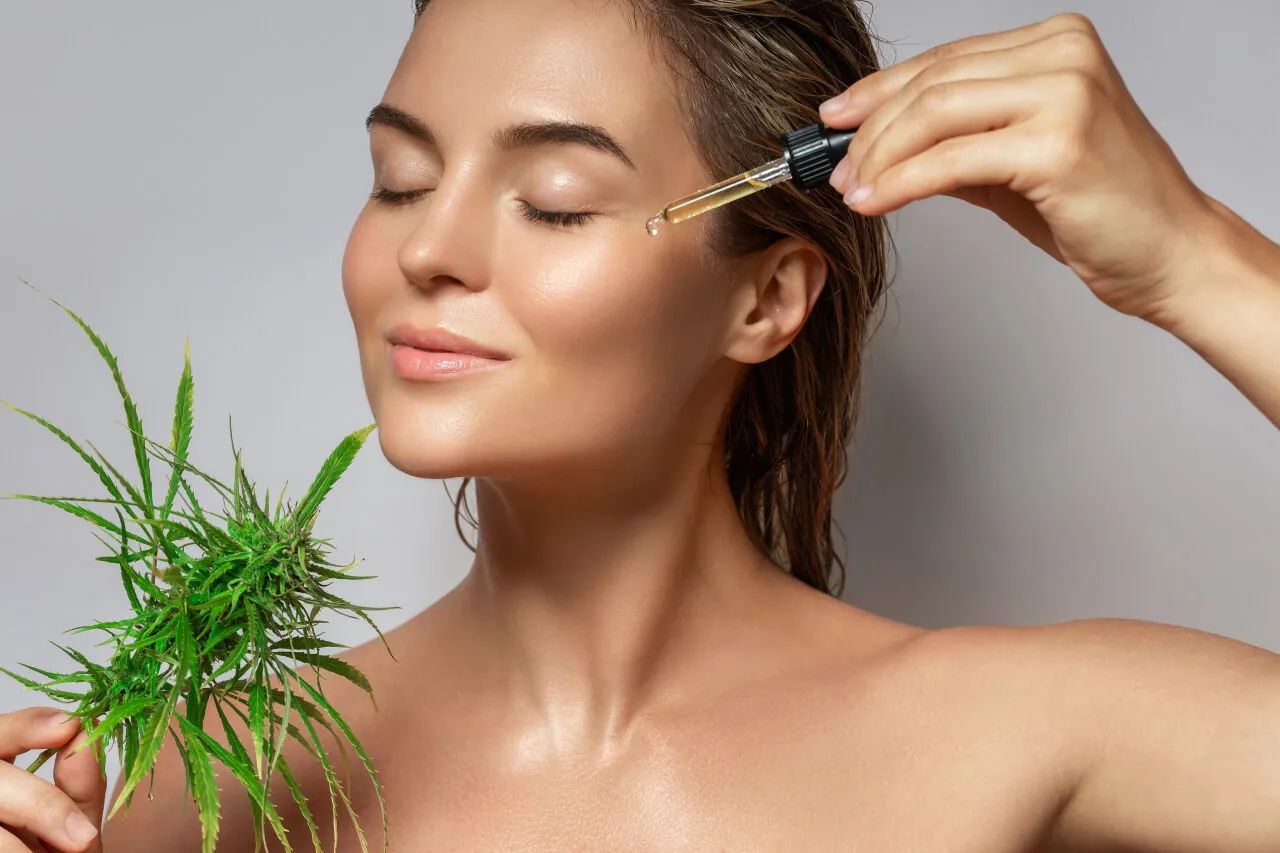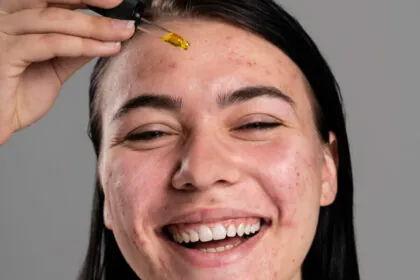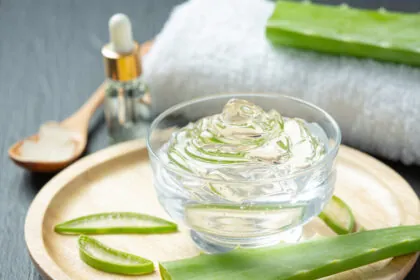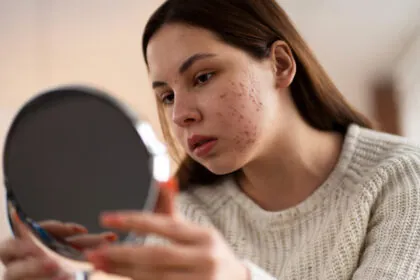Acne is a common skin condition that affects millions of people worldwide. It can cause inflammation, redness, pain, and scarring on the face and other parts of the body.
Acne can also affect one’s self-esteem and confidence.
While there are many treatments available for acne, some of them may have side effects or be ineffective for some people.
That’s why many people are looking for natural alternatives to treat their acne, such as CBD oil.
What is CBD?
CBD, or cannabidiol, is one of the many compounds found in the cannabis plant.
Unlike THC, the psychoactive component of cannabis, CBD does not cause a high or impair one’s cognitive functions.
CBD has been shown to have various health benefits, such as reducing pain, inflammation, anxiety, depression, seizures.
Symptoms of acne and how CBD works
Acne is a common skin condition that occurs when hair follicles become clogged with oil and dead skin cells.
It often presents as pimples, blackheads, whiteheads, and, in more severe cases, cysts or nodules. Here’s an overview of acne and its common causes:
Hair Follicles and Sebaceous Glands:
-
- Hair follicles are small sacs in the skin that house hair and oil-producing sebaceous glands.
- Sebaceous glands produce sebum, an oily substance that helps keep the skin lubricated.
Formation of Acne Lesions:
-
- Acne begins when hair follicles become clogged with excess sebum and dead skin cells.
- The combination of oil and dead skin cells creates an environment for the growth of bacteria.
Types of Acne Lesions:
-
- Pimples (Papules and Pustules): Small red or pink bumps on the skin, some with a white or yellow center.
- Blackheads: Open comedones with a dark surface due to oxidation of melanin.
- Whiteheads: Closed comedones with a small, white bump under the skin.
- Cysts and Nodules: Large, painful, and deep lumps beneath the surface.
Common Causes of Acne:
-
- Excess Sebum Production: Overproduction of sebum can clog pores and contribute to acne.
- Hair Follicle Clogging: Dead skin cells and sebum accumulate, leading to clogged pores.
- Bacterial Growth: Propionibacterium acnes (P. acnes) bacteria thrive in clogged pores, causing inflammation.
Hormonal Fluctuations:
-
- Hormonal changes, especially during puberty, menstruation, and pregnancy, can stimulate sebum production.
- Androgens, male hormones present in both males and females, play a role in acne development.
Genetics:
-
- Acne can have a genetic component, with a family history of acne increasing the likelihood of developing the condition.
Dietary Factors:
-
- Some studies suggest a link between certain foods, such as dairy and high-glycemic foods, and acne.
- However, the impact of diet on acne varies among individuals.
Stress:
-
- Stress can trigger hormonal changes that may contribute to acne flare-ups.
- It can also worsen existing acne due to an inflammatory response.
Cosmetic and Skincare Products:
-
- Some makeup and skincare products can clog pores or irritate the skin, leading to acne.
- Non-comedogenic products are recommended for individuals prone to acne.
Environmental Factors:
-
- Exposure to pollutants and high humidity can contribute to clogged pores and acne development.
Sebum is the natural oil that lubricates and protects the skin, but when it is produced in excess, it can mix with dead skin cells and dirt and clog the pores.
This creates an ideal environment for bacteria to grow and cause infection and inflammation.
Acne can manifest in different forms, such as whiteheads, blackheads, pimples, cysts, and nodules.
CBD may help with acne by targeting some of the underlying causes and symptoms of the condition.
CBD has anti-inflammatory properties that can reduce the swelling, redness, and pain associated with acne.
CBD also has antibacterial effects that can prevent or treat the infection caused by bacteria.
CBD can also regulate the production of sebum by interacting with the endocannabinoid system, which is a network of receptors and molecules that regulate various bodily functions, including skin health.
By balancing the sebum levels, CBD can prevent the pores from getting clogged and reduce the chances of acne breakouts.
3 Mechanisms and Effects that help CBD oil with acne
CBD oil can help with acne through three main mechanisms and effects:
Anti-inflammatory:
CBD oil can reduce the inflammation that is associated with acne.
Inflammation is the body’s natural response to injury or infection, but when it is chronic or excessive, it can cause damage and pain to the tissues.
CBD oil can modulate the immune system and inhibit the production of pro-inflammatory cytokines, which are molecules that trigger and sustain inflammation.
By reducing inflammation, CBD oil can alleviate the symptoms of acne, such as redness, swelling, and soreness.
Antibacterial
CBD oil can fight the bacteria that cause acne.
Bacteria are microorganisms that can infect the skin and cause inflammation and pus.
CBD oil can kill or inhibit the growth of bacteria by disrupting their cell membranes and interfering with their metabolic processes.
By eliminating or preventing the bacteria, CBD oil can reduce the infection and inflammation that result from acne.
Sebum-regulating
CBD oil can regulate the production of sebum, which is the natural oil that lubricates and protects the skin.
Sebum is essential for skin health, but when it is produced in excess, it can clog the pores and cause acne.
CBD oil can influence the sebaceous glands, which are the glands that produce sebum, by interacting with the endocannabinoid system.
CBD oil can activate or inhibit the endocannabinoid receptors that control the sebum production, depending on the needs of the skin.
By balancing the sebum levels, CBD oil can prevent the pores from getting clogged and reduce the chances of acne breakouts.
CBD’s role in preventing or minimizing acne-related scarring.
CBD’s potential role in preventing or minimizing acne-related scarring is an intriguing aspect of its skincare benefits.
While research is still in its early stages, there are several ways in which CBD may contribute to scar prevention and reduction:
-
- CBD has been suggested to promote skin regeneration and repair.
- By supporting the regeneration of skin cells, CBD may aid in the healing process and reduce the likelihood of scarring.
Collagen Production:
-
- Collagen is a crucial protein for maintaining skin structure and elasticity.
- Some studies suggest that CBD may stimulate collagen production, promoting healthier skin and potentially minimizing the appearance of scars.
Antioxidant Effects:
-
- CBD is a potent antioxidant, protecting the skin from oxidative stress caused by free radicals.
- Oxidative stress can contribute to the development of scars, and CBD’s antioxidant properties may help counteract this process.
Moisturizing and Hydration:
-
- CBD has moisturizing properties that can help keep the skin hydrated.
- Well-hydrated skin is more resilient and less prone to scarring, as it can heal more effectively.
Reducing Hyperpigmentation:
-
- CBD may play a role in reducing hyperpigmentation, a common concern in post-inflammatory hyperpigmentation (PIH) after acne lesions.
- By addressing pigmentation issues, CBD may contribute to a more even skin tone and minimize the visibility of scars.
Inhibiting Excessive Sebum Production:
-
- Excessive sebum production is a factor in acne development and scarring.
- CBD has been studied for its potential to regulate sebum production, addressing one of the root causes of acne and potentially reducing scarring.
Preventing Secondary Infections:
-
- CBD’s antimicrobial properties may help prevent secondary infections in acne lesions.
- By preventing infections, CBD may reduce the risk of more severe inflammation and scarring.
How to cure acne with CBD oil
There is no definitive cure for acne, but CBD oil may help to manage and improve the condition.
CBD oil can be used in different ways to treat acne, depending on one’s preference and needs. Here are some of the methods that one can try:
Topical application
CBD oil can be applied directly to the affected areas of the skin using a dropper, a cotton pad, or a finger.
This method allows the CBD to penetrate the skin and target the inflammation and bacteria.
CBD oil can also be mixed with other ingredients, such as aloe vera, honey, or tea tree oil, to enhance its effects and benefits.
CBD oil can be applied once or twice a day, depending on the severity of the acne.
Oral ingestion
CBD oil can be taken orally as a supplement to support the overall health and wellness of the body.
This method allows the CBD to enter the bloodstream and interact with the endocannabinoid system, which can affect the sebum production and hormonal balance.
CBD oil can be taken by placing a few drops under the tongue and holding it for a few seconds before swallowing.
CBD oil can also be added to food or drinks, such as smoothies, coffee, or salads.
CBD oil can be taken once or twice a day, depending on the dosage and the desired effects.
Inhalation
CBD oil can be inhaled using a vaporizer or a vape pen.
This method allows the CBD to reach the lungs and the bloodstream quickly and efficiently.
Inhalation can provide fast and immediate relief for acne symptoms, such as pain and inflammation.
CBD oil can be inhaled by filling a vaporizer or a vape pen with CBD oil and inhaling the vapor.
CBD oil can be inhaled as needed, depending on the severity of the acne.
Conclusion
CBD oil is a natural and effective remedy for acne. CBD oil can help with acne by reducing inflammation, fighting bacteria, and regulating sebum production.
CBD oil can be used in different ways, such as topical application, oral ingestion, or inhalation, depending on one’s preference and needs.
CBD oil may not cure acne completely, but it can improve the condition and prevent further complications.
CBD oil is generally safe and well-tolerated, but it is advisable to consult a doctor before using it, especially if one has a medical condition or is taking medication.
CBD oil may also have some side effects, such as dry mouth, drowsiness, or changes in appetite, so it is important to monitor one’s reactions and adjust the dosage accordingly.
CBD oil is a promising and potent solution for acne that can offer relief and improvement for many people.
FAQs
Can CBD oil cure acne completely?
While CBD oil may not provide a complete cure for acne, it has shown effectiveness in managing and improving the condition.
It helps by addressing underlying causes and symptoms, such as inflammation, bacterial growth, and sebum regulation.
Are there any side effects of using CBD oil for acne?
CBD oil is generally safe and well-tolerated.
However, some individuals may experience mild side effects such as dry mouth, drowsiness, or changes in appetite.
It is advisable to monitor your reactions and consult with a healthcare professional, especially if you have pre-existing medical conditions or are taking medications.
What is the recommended dosage of CBD oil for acne?
The optimal dosage of CBD oil for acne can vary among individuals.
It’s advisable to start with a lower dosage and gradually increase it based on your body’s response.
Consulting with a healthcare professional can help determine the right dosage for your specific needs.
How long does it take for CBD oil to show results in managing acne?
The time it takes for CBD oil to show results in managing acne can vary.
Some individuals may experience relief relatively quickly, while others may require a more extended period.
Consistent use and patience are key, and individual responses may differ.
Can I use CBD oil topically for acne-prone skin?
Yes, CBD oil can be applied topically for acne-prone skin.
Mixing it with carrier oils or incorporating it into skincare products can enhance its effects.
Topical application allows CBD to target specific areas, addressing inflammation and promoting skin health.
Is CBD oil suitable for all skin types, including sensitive skin?
CBD oil is generally suitable for various skin types, including sensitive skin.
Its natural and anti-inflammatory properties make it a gentle option.
However, it’s recommended to perform a patch test before widespread use to ensure compatibility and consult with a dermatologist if you have specific skin concerns.





